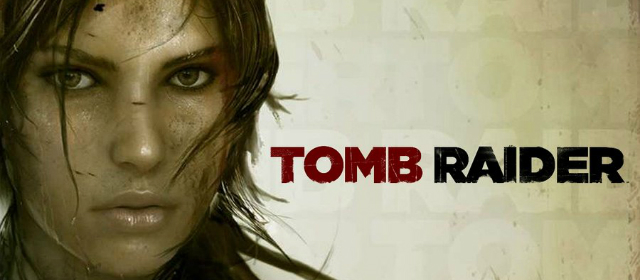Aside a fairly significant overhaul of the frankly less-than-stellar multiplayer mode there really wasn’t much that Crystal Dynamics could do to improve on their triumphant Tomb Raider reboot. A smattering of overly “gamey” mechanics notwithstanding, their mud and blood-soaked origin story was astonishing, taking cues from both Uncharted and Assassin’s Creed to drag gaming’s First Lady into the HD era with aplomb.
Opening with a shipwreck that sees our plucky young heroine plunged into a nightmare on a distant island inhabited by a group of crazed, Goddess-worshipping cultists, it’s a baptism of fire deal as Lara Croft is forced to adapt to live, learning to survive and to kill with equal efficiency. Despite degenerating at times into a bit of a brainless shooter with far too high a body count, the mix of puzzles, action and exploration earned Tomb Raider numerous awards, an array of high-end review scores and a placement on many a Game of the Year list (including our own).
So when Square-Enix announced the development of the Definitive Edition for next-gen consoles, the question was: how will they improve on the original? The answer, for better or worse, is almost utterly skin-deep.
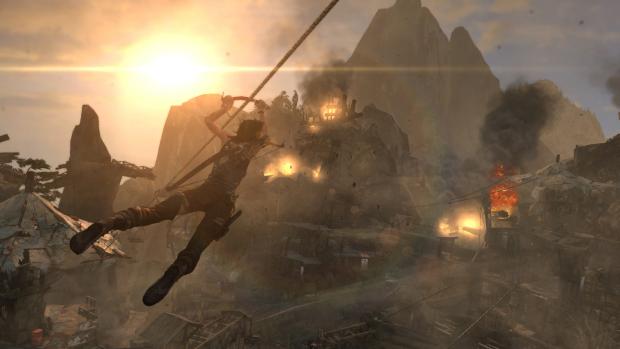
The entire game has been tweaked and sharpened, with a greater attention to detail, more complex textures, improved lighting and weather effects. Character models don’t appear to be much changed, except for Lara, of course. She has been redesigned, given raven hair and a tougher countenance to bring her more in line with the Lara we remember from the earlier games. She looks harder in the face – she’s still beautiful, still hiding her vulnerabilities beneath a determined scowl, but she’s harder nonetheless. It should be noted, however, that they could have quality tested the graphics slightly better at times: no matter which Lara you see after she makes it to the island, whether in lashing rain or climbing out of the water, or even on the boat in the flashbacks set before the island, the mud-stains on her face are present and never change. It is noticeable, and it can be slightly annoying when the developers have worked so hard to make the overall experience an immersive one.
That aside, the graphics are astounding. Cut-scene animations are butter-smooth, the weather and lighting contributing to a powerful sense of place – Tomb Raider puts you there with Lara at all times, envelopes you in its atmosphere in a way few games can match. There are odd moments when you may find yourself wishing for something more hardcore – an early-game event, for instance, sees you forced to hunt a deer for meat, but it’s the only time you’ll ever have to feed Lara. Likewise, you can pick certain plants to earn XP, but there’s little point beyond that as they do nothing. Being forced to really survive, to eat and make medicines or poisons to aid Lara’s desperate struggle would have deepened the game considerably, and (although it’s been said before) a few more tombs to raid wouldn’t have gone amiss.
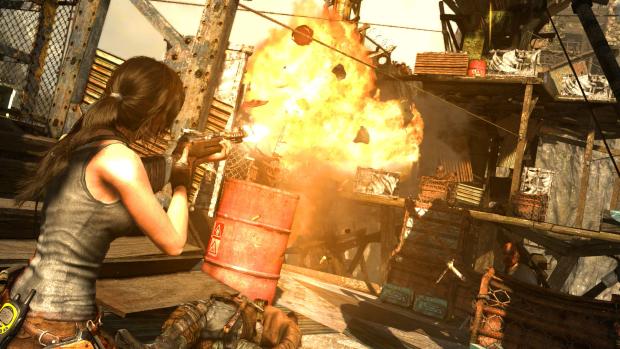
If you’ve already played through the game on last-gen hardware, however, there isn’t much of a reason to come back beyond the fact that it’s such a playable game. The Definitive Edition adds a few gimmicky touches, like voice commands, for example. Unfortunately, as convenient as it is, issuing commands into your mic (or towards your Kinect device) like “bow”, “gun”, “show map” and “silencer” are at odds with Lara’s hands-on approach. It’s a nice touch, but each command only negates a single button press, and so it doesn’t feel particularly essential. A rather cool addition on the PS4 makes interesting use of the controller’s divisive light display. Strike up your torch (which you can now do with a handy swipe of the central touchpad) and the light will fluctuate between red, orange and yellow to simulate flames; fire your weapon, and it will burst with white muzzle flash. Used in conjunction with the Dual Shock 4’s onboard speakers that enhance gunshots, footsteps and rumbling thunder, it’s a great aid to the immersion.
The PS4 version obviously enables remote play on the Vita, which works wonderfully well, integrating the touchscreen with the in-game map and only having to map one command (Lara’s Survival Instinct) to the actual screen. Blessedly, the rear touchpad isn’t needed at all. On occasion, the environments are a little busy for the smaller screen to handle – unlike, say, Assassin’s Creed IV, Tomb Raider is rarely well-lit, and you’re often at the mercy of howling winds, pounding rain and roaring flames. There’s no second screen option, however, which might have come in handy when orienteering for collectibles to earn that elusive 100% completion.
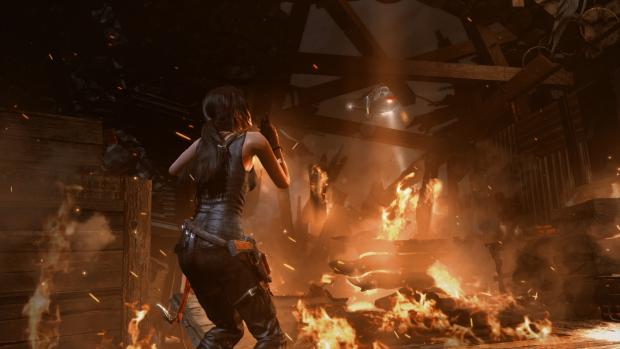
Lara controls as well as she always did, though I had less trouble with some of the jumps than on the 360 version. Whether that was down to the smoother framerate or the wonders of the DualShock 4, I can’t say, but the difference is notable. The Definitive Edition also comes bundled with the Tomb of the Adventurer DLC, which is a single extra tomb near the beginning of the game, and a handful of cool outfits for Lara to wear like a climbing kit, a professional archer’s get-up or a 1930’s bomber jacket. The effect is purely aesthetic, but it’s always nice to have options.
Sadly, there has been a missed opportunity to improve the unformed multiplayer. They’ve added in the DLC maps and skin-packs, but beyond that they’ve done nothing to build upon it. Despite a few interesting modes like Cry For Help, it’s still very vanilla, almost like a diluted version of Uncharted’s online offering. A game like Tomb Raider cries out for a leaderboard challenge pack full of time trials and obstacle courses, stealth challenges and skill-testing arenas. Several combinations of Team Deathmatch and capture challenges is selling it short, and just doesn’t live up to the brilliant campaign.
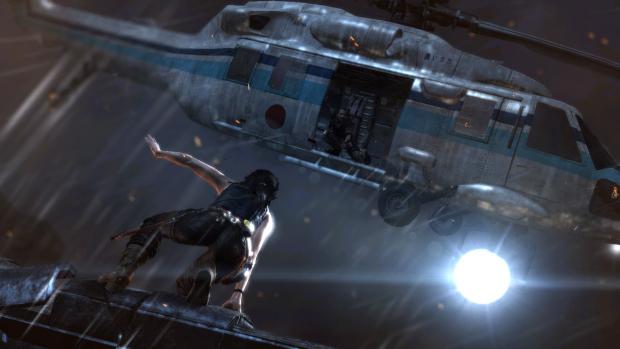
VERDICT: This really is the Definitive Edition of Tomb Raider, but only because of the graphical overhaul. If you had issues before with the direction in which Crystal Dynamics have taken the character, or with the occasional intrusion of gameplay elements like levelling up and Lara’s ability to carry six weapons in invisible holsters, you won’t find anything here to change your opinions.
Without question, the full retail price is too high for a slightly shinier version of a game you clocked 10 months ago, but if you missed the original release for whatever reason, or even played it back in March last year and really feel it’s worth another go around, the Definitive Edition is recommended.

SUPERB. This is the mark of greatness, only awarded to games that engage us from start to finish. Titles that score 9/10 will have very few problems or negative issues, and will deliver high quality and value for money across all aspects of their design.
Review code provided by publisher.


